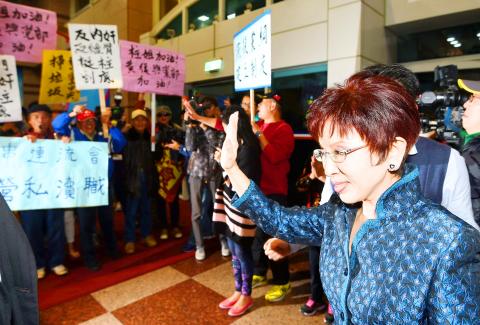Chinese Nationalist Party (KMT) Chairwoman Hung Hsiu-chu (洪秀柱) yesterday apologized to supporters for the “disturbance” that the KMT’s Central Standing Committee meeting last week has caused over a change made to the party’s chairperson election date.
In yesterday’s committee meeting, which was open to the media, there were no angry exchanges among party heavyweights and committee members as there had been in the past week, with many accusing the chairwoman of violating party regulations for her own ends.
On Wednesday last week, Hung reportedly railroaded a motion to move forward next year’s chairperson election by two months by arbitrarily interpreting the definition of a meeting quorum, when more than 20 committee members allegedly boycotted the meeting.

Photo: Fang Pin-chao, Taipei Times
The move has since sparked harsh criticism within the party, with committee member Yao Chiang-lin (姚江臨) filing a civil suit and KMT caucus convener Sufin Siluko (廖國棟) urging Hung to step down.
Hung yesterday said that as the party is facing multiple challenges, “there is no tomorrow if new breakthroughs cannot be made.”
“Solidarity and reform” is not paying lip service and only sincere communication to reach a consensus would be good for the party,” Hung said.
“There can be different views,” she said, calling on the committee members to attend the meeting to avoid misunderstandings.
A reconsideration was proposed in yesterday’s committee meeting for the motion passed on Wednesday last week, and while those who were against the motion, including Sufin and Yao, did not comment, they kept their hands down when others clapped their hands to celebrate the passage of the reconsideration.
Yao had said that he would withdraw the lawsuit if a consensus was reached yesterday, while Sufin denied that there was antagonism between he and Hung.
It was also announced in the meeting that the date for the party’s election of representatives and chairperson would remain unchanged — May 20 — but the planned merger of the party’s deep-blue Huang Fu-hsing (黃復興) military veterans’ branch with the party representative election of general local party chapters was postponed until 2021.
The total number of representatives for next year’s elections will be recalculated with more seats expected to be granted to the Huang Fu-hsing branch, KMT Secretary-General Mo Tien-hu (莫天虎) said.
Before yesterday’s meeting, there had been no dispute over the election date, sources said, adding that the debate was over merging the Huang Fu-hsing branch elections with that of general local branches, which would mean that about 90,000 members of the Huang Fu-hsing branch would no longer voting in a separate election.
The military branch has long been seen as a stronghold for “deep-blue” and “pro-China” factions, and the merger would mean a “dilution” of the votes for the party’s pro-localization faction.

INVESTIGATION: The case is the latest instance of a DPP figure being implicated in an espionage network accused of allegedly leaking information to Chinese intelligence Democratic Progressive Party (DPP) member Ho Jen-chieh (何仁傑) was detained and held incommunicado yesterday on suspicion of spying for China during his tenure as assistant to then-minister of foreign affairs Joseph Wu (吳釗燮). The Taipei District Prosecutors’ Office said Ho was implicated during its investigation into alleged spying activities by former Presidential Office consultant Wu Shang-yu (吳尚雨). Prosecutors said there is reason to believe Ho breached the National Security Act (國家安全法) by leaking classified Ministry of Foreign Affairs information to Chinese intelligence. Following interrogation, prosecutors petitioned the Taipei District Court to detain Ho, citing concerns over potential collusion or tampering of evidence. The

Seventy percent of middle and elementary schools now conduct English classes entirely in English, the Ministry of Education said, as it encourages schools nationwide to adopt this practice Minister of Education (MOE) Cheng Ying-yao (鄭英耀) is scheduled to present a report on the government’s bilingual education policy to the Legislative Yuan’s Education and Culture Committee today. The report would outline strategies aimed at expanding access to education, reducing regional disparities and improving talent cultivation. Implementation of bilingual education policies has varied across local governments, occasionally drawing public criticism. For example, some schools have required teachers of non-English subjects to pass English proficiency

NEGOTIATIONS: The US response to the countermeasures and plans Taiwan presented has been positive, including boosting procurement and investment, the president said Taiwan is included in the first group for trade negotiations with the US, President William Lai (賴清德) said yesterday, as he seeks to shield Taiwanese exporters from a 32 percent tariff. In Washington, US Trade Representative Jamieson Greer said in an interview on Fox News on Thursday that he would speak to his Taiwanese and Israeli counterparts yesterday about tariffs after holding a long discussion with the Vietnamese earlier. US President Donald Trump on Wednesday postponed punishing levies on multiple trade partners, including Taiwan, for three months after trillions of US dollars were wiped off global markets. He has maintained a 10 percent

TRADE: The premier pledged safeguards on ‘Made in Taiwan’ labeling, anti-dumping measures and stricter export controls to strengthen its position in trade talks Products labeled “made in Taiwan” must be genuinely made in Taiwan, Premier Cho Jung-tai (卓榮泰) said yesterday, vowing to enforce strict safeguards against “origin laundering” and initiate anti-dumping investigations to prevent China dumping its products in Taiwan. Cho made the remarks in a discussion session with representatives from industries in Kaohsiung. In response to the US government’s recent announcement of “reciprocal” tariffs on its trading partners, President William Lai (賴清德) and Cho last week began a series of consultations with industry leaders nationwide to gather feedback and address concerns. Taiwanese and US officials held a videoconference on Friday evening to discuss the